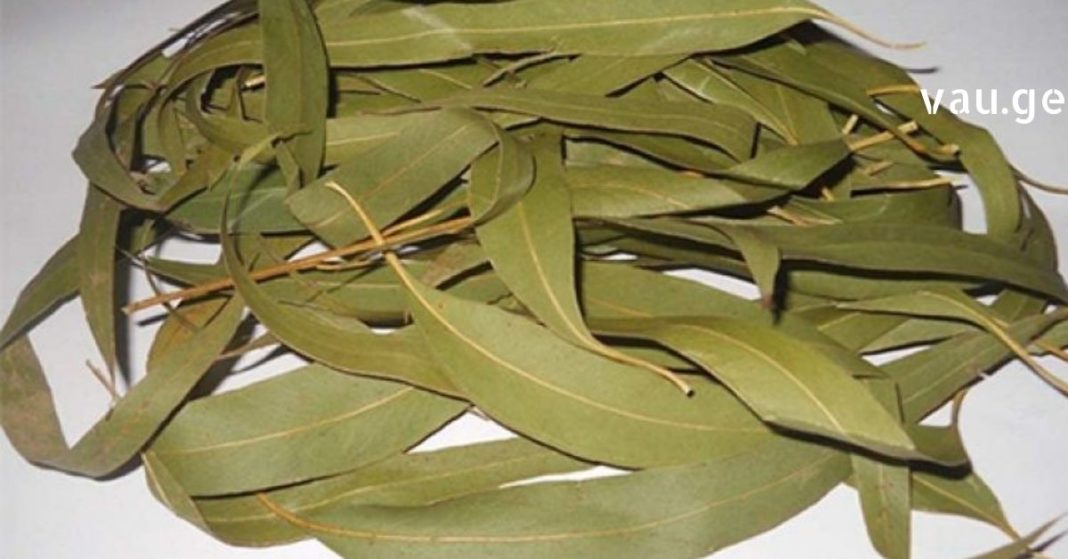Eucalyptus is widely recognized for its strong anti-inflammatory properties, especially when it comes to respiratory tract inflammation. The leaves and young shoots of the eucalyptus tree, typically harvested between September and October, are the most commonly used parts of the plant for medicinal purposes.
The leaves of eucalyptus contain a rich blend of beneficial compounds. These include essential oils, especially high concentrations of cineole, along with ethyl alcohol, tannins, bitter substances, resins, and organic acids. Furthermore, eucalyptus leaves are a natural source of both macro and microelements vital for human health. Key macroelements include potassium, calcium, magnesium, and iron, while trace elements such as manganese, copper, zinc, cobalt, molybdenum, chromium, aluminum, barium, selenium, nickel, strontium, lead, iodine, and boron are also present.
Thanks to this complex chemical composition, eucalyptus leaves are effectively used to treat a variety of health issues. These include:
- Carbuncles
- Abscesses
- Tracheitis
- Blepharitis (inflammation of the eyelids)
- Furunculosis (recurring boils)
- Bronchitis
- Ulcers
- Acne
- Laryngitis
- Skin infections and boils
Eucalyptus Tea / Infusion
To prepare a eucalyptus tea, take one tablespoon of crushed eucalyptus leaves and pour one liter of boiling water over them. Let the mixture steep until it reaches a warm temperature. Consume one small glass (approximately 100 ml) three times a day, before meals. This same infusion can also be used for inhalation in cases of respiratory illness.
Eucalyptus Oil
Eucalyptus essential oil is another powerful component derived from the plant. It is commonly applied externally for treating various skin infections, purulent wounds, myositis (muscle inflammation), neuralgia, and radiculitis. The oil is also suitable for gargling in cases of sore throat, and for steam inhalation.
For nasal congestion or sinus issues, a blend of eucalyptus oil mixed in equal parts with sunflower or olive oil (ratio 1:1) can be used as nasal drops.
The essential oil of eucalyptus provides multiple therapeutic effects, such as:
- Antibacterial
- Antiviral
- Anti-inflammatory
- Pain-relieving
- Spasmolytic (relieves muscle spasms)
- Antiparasitic
- Fever-reducing
- Expectorant
- Diuretic
- Skin-soothing
- Blood-purifying
It can be used in steam inhalation, as a natural air freshener or disinfectant, and also in the preparation of ointments and creams for topical use.
Warm Eucalyptus Infusion
Add one tablespoon of eucalyptus leaves to one cup (200 ml) of boiling water. Let it steep for 45 minutes, then strain. Drink one-third of a cup, three times a day, 30 minutes before meals. This remedy is particularly effective for:
- Stomach pain
- Low-acidity gastritis
- Acute respiratory illnesses
Strong Decoction for Digestive and Respiratory Illnesses
To prepare, boil 20 grams of crushed, dried eucalyptus leaves in 200 ml of water over low heat for 15 minutes. Let it stand for 45 minutes, strain, and then add boiled water to bring the volume back to 200 ml. Take two tablespoons of this decoction three times daily, 30 minutes before meals.
Alcoholic Tincture
For respiratory and digestive tract conditions, including cough, laryngitis, tracheitis, pleuritis, lung abscess, or gangrene, prepare an alcoholic tincture by pouring 1 liter of 70% alcohol over 50 grams of crushed eucalyptus leaves. Let the mixture infuse for 14 days in a dark place, shaking occasionally. After two weeks, strain it through cheesecloth. For inhalation, add 10-20 drops to one cup of hot water. Internally, take 15-20 drops three times daily after meals.
Compresses
For infected wounds, phlegmons, abscesses, purulent mastitis, burns, frostbite, rheumatism, or radiculitis, pour 500 ml of boiling water over 2 tablespoons of eucalyptus leaves and let it steep in a thermos for 2 hours. Strain the liquid, soak a cloth or cotton pad in it, and apply it to the affected area for 20–40 minutes.
Inhalation
For upper respiratory tract conditions such as bronchitis, laryngitis, lung abscesses, tracheitis, or pharyngitis, use 20 teaspoons of crushed leaves boiled in 200 ml of water for 15 minutes. Strain the mixture and inhale the steam twice a day for 3–10 minutes.
Hair Care
To combat dandruff and hair loss, pour 200 ml of boiling water over 30 grams of dried eucalyptus leaves. Let it steep in a thermos for one hour. Strain and rinse your hair with the infusion after washing.


















